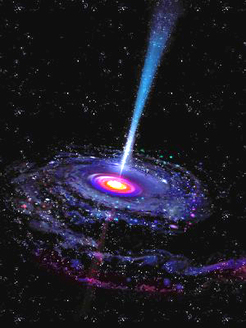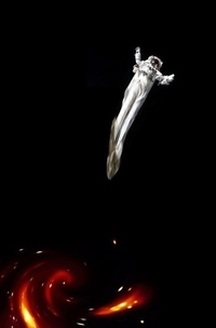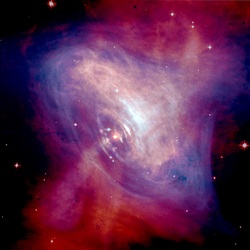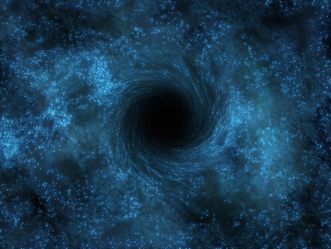 guys. I'm not really that mean, ya know. Who doesn't enjoy a good science fiction? I myself prefer it over real life based movies or books. But in entertainment, script writers can't help but twist facts a little bit to fit the taste of the audience. There are a lot of science fiction that have featured black holes. Some of which that I am familiar of are the shows Star Trek, Doctor Who and Star wars. Though of course, facts in this shows are stretched due to the fact that they are set in the future where they have all sorts of cool gadgets and Treknology , or that there are Time Lords that travel space and time or simply took place a long time ago in a galaxy far, far away. But in reality, what are Black Holes? I attempted to justify the black hole by first linking a short video about it. But sadly, I wasn't able to find a decent video that did not have comments that kept on clashing with religion so I guess I'll just skip that part. However, I did find a documentary about black holes. It runs for about 45 minutes but it's a good watch. The documentary actually goes deep in the subject of black holes. So here are the basic facts about them. What is a Black HoleA black hole is a place in space where gravity pulls so much that even light can not get out. The gravity is so strong because matter has been squeezed into a tiny space. This can happen when a star is dying. Black holes are so dense that their escape velocity is greater than light’s speed of 300,000 kilometers per second. Anything can become a black hole if it’s made dense enough. An atom, a star, it’s all the same to physics. Make the volume of something—anything—small enough and it will become a black hole. Because no light can get out, people can't see black holes. They are invisible. Space telescopes with special tools can help find black holes. The special tools can see how stars that are very close to black holes act differently than other stars. Another name for it is Frozen Star It's burned its fuel out and is collapsing inwards. No 'normal' fusion is taking place and the star has ceased to give off light therefore it is frozen. Some people think a singularity is also a name for a black hole: this is a part of the black hole where the gravity reaches (theoretically) infinity. SpagettificationImagine you, by some unfortunate event, get close enough to a black hole that you get sucked into it. This event actually isn't cool. If you have gotten your facts straight about black holes, you'll know what happens next. You'll get spagettified.  spagettified astronaut Like this unfortunate guy. "An object in any very strong gravitational field feels a tidal force stretching it in the direction of the object generating the gravitational field. This is because the inverse square law causes nearer parts of the stretched object to feel a stronger attraction than farther parts. Near black holes, the tidal force is expected to be strong enough to deform any object falling into it, even atoms or composite nucleons" In simpler words, let's say you fall into a black hole feet first. The gravity on your feet is stronger that that on your head, thus stretching your body as you go deeper into the black hole. And eventually, you'll get snapped in two. Not so cool now, huh (unless this is the way you prefer to die). What causes a Black Hole "i'm going supernovaaaa!" Black holes are the end result of gravitational collapse when there is insufficient energy to keep matter from falling into a singularity and then outside of the known laws of physics for this universe. An example of this is when a star dies. For a more physical example, take your body. If you could condense the atoms in your body so that there was no space between sub-atomic particles, you would collapse into an object so small, not even someone using a scanning electron microscope would be able to see you. Take that and apply it to a star three times the mass of the sun. The sun expends its fuel and collapses dramatically during a supernova explosion-implosion event. The final fate of the star after a supernova depends on the amount of mass left in the core after the explosion. If the star has gravity so great that nothing can stop the collapse of the star, it will continue to be squeezed into a smaller and smaller space until the gravity of the star is able to trap light inside of what is known as the 'event horizon' which creates a black hole. How Big Are Black Holes?  "Hello. My name's Supermassive Black Hole." Black holes can be big or small. Scientists think the smallest black holes are as small as just one atom. These black holes are very tiny but have the mass of a large mountain. Mass is the amount of matter, or "stuff," in an object. Another kind of black hole is called "stellar." Its mass can be up to 20 times more than the mass of the sun. There may be many, many stellar mass black holes in Earth's galaxy. Earth's galaxy is called the Milky Way. The largest black holes are called "supermassive." These black holes have masses that are more than 1 million suns together. Scientists have found proof that every large galaxy contains a supermassive black hole at its center. The supermassive black hole at the center of the Milky Way galaxy is called Sagittarius A. It has a mass equal to about 4 million suns and would fit inside a very large ball that could hold a few million Earths. There are a lot more stuff that I'd like to add in this post but it's getting terribly long ( and I think I'm boring those who bothered to read until the end ) so here's a like to 10 Interesting Facts About Black Holes. For some non-serious matter, here's a short film entitled Black Hole. Literally a black hole. On a piece of paper. That functions like a mini wormhole. It's kinda stupid and creative at the same time. I like it. Have a great week! Checked by Prof. Cricencio Paner
6 Comments
jeorje
6/26/2012 02:59:24 am
hi,
Jen
7/2/2012 06:57:25 pm
Thank you!
xela
6/26/2012 11:02:57 am
The rest of the universe is a really interesting topic. Hope to see more posts from you
Jen
7/2/2012 06:57:49 pm
Thanks :D
Polaris
6/27/2012 09:25:51 pm
man, awesome blog. White holes next? white holes next!
Jen
7/2/2012 06:59:24 pm
I'd do one if I get the chance. Currently, my professor wants use to do an article about the environment but I'll keep you suggestion in mind. :D Leave a Reply. |
| All of Space and Time |
|
 RSS Feed
RSS Feed